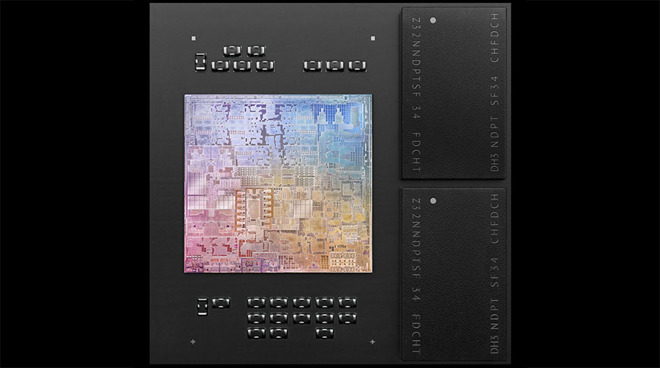With Apple's first Apple silicon Macs due to arrive in the coming days, early benchmark testing on Wednesday reveals the company's new M1 chip outperforms its top Intel-based machines.

A Geekbench test result from a "MacBookAir10,1," the designation of Apple's just-announced MacBook Air with M1 chip, reveals a single-core score of 1687 and a multi-core score of 7433. The 8-core processor was clocked at 3.2 GHz.
By comparison, aggregate scores compiled by the benchmarking site show the M1 blowing past all mobile Macs, all current Mac mini configurations and a healthy portion of iMac specs. That includes the late-2019 MacBook Pro with Intel Core i9-9980HK processor clocked at 2.4 GHz.
According to the unverified results, the MacBook Air testbed was equipped with 8GB of RAM and ran macOS 11.0.1, the forthcoming next-generation operating system due for wide release on Thursday.
In introducing the M1 on Tuesday, Apple touted its first in house-designed Mac chip as a breakthrough for desktop processing. With leading performance per watt and extreme power efficiency, the silicon is expected to shake up the semiconductor market.
Apple has failed to produce exact specifications for its first ARM-based Mac chip design, but does note the silicon is up to two times faster than competing PC processors while sipping power. M1's integrated graphics module also offers up to two times the performance as compared to leading solutions, though comprehensive graphics benchmarks have yet to surface.
In addition to raw processing power, M1 incorporates custom Apple technology like a 16-core Neural Engine for machine learning computations, specialized image signal processor, and a unified memory subsystem. It remains to be seen whether the latter will prove a detriment to typically RAM-intensive operations.
The MacBook Air, 13-inch MacBook Pro and Mac mini are the first machines to benefit from the M1. Orders for the new hardware went live yesterday, with shipments due to arrive on Friday.


